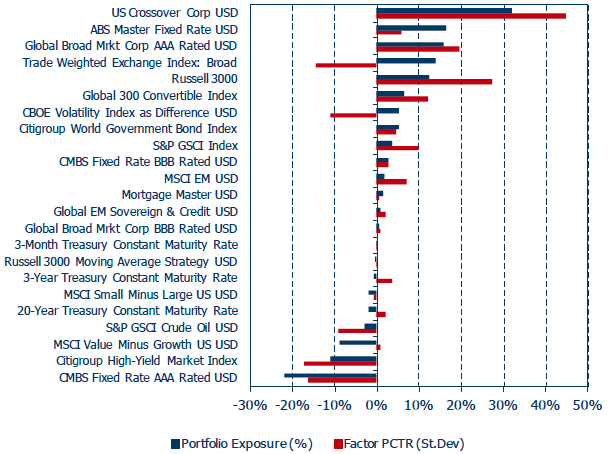(November 25, 2013) – A repeat of the 2001 dot-com crash would hurt the world’s largest hedge funds worse than other 2008-style financial crisis, according to stress tests by eVestment.
Using self-reported portfolio data, the firm performed a risk factor analysis of the top 30 funds measured by assets under management.
“It surprised me that of the 11 stress tests, the bursting of the tech bubble and Nasdaq crash would have had the greatest negative impact on the group,” Peter Laurelli, vice president of eVestment’s research group, told aiCIO. “I would have thought that with these being the largest funds, there might be greater sensitivity to broad volatility like we saw the financial crisis.”
In fact, the data indicated that these large funds have positioned themselves fairly conservatively to the risk factors most in play during 2008.
As of September, exposure to equity risk accounted for 34.4% of the 30 funds’ total portfolio risk, according to eVestment’s analysis. Fixed income contributed 59.3%, weighted heavily by large allocations to mid- and high-grade corporate bonds. Interest rate risk made up 5.7%, while exposures to commodity markets contributed just 0.8%.
“The disproportionate exposure to securitized credit markets is another takeaway of this study,” Laurelli said. For nine of the funds’ top 10 exposures, a price move produced a diminishing impact on the value of the aggregate portfolio. That is, a 5% drop in the Russell 3000 would cause the hedge funds’ aggregate value to fall by less than 5%.
“But if when we tried shocking the asset-backed securities factor by 3%, the portfolio is expected to decline in value by 4%,” Laurelli recounted. “A 7% price shock, and the portfolio drops by 9%. But then again, the portfolio’s reactions to gains in asset-back securities are even greater.”
Laurelli wouldn’t reveal the full list of funds in the top 30, but it is sure to include giants such as Bridgewater Associates, AQR, Citadel, DE Shaw, Moore Capital, and Brevan Howard Asset Management.
“It’s the usual suspects,” Laurelli said.
Aggregate Portfolio Exposure & Factor Percentage Contribution to Risk

Graphic source: eVestment
